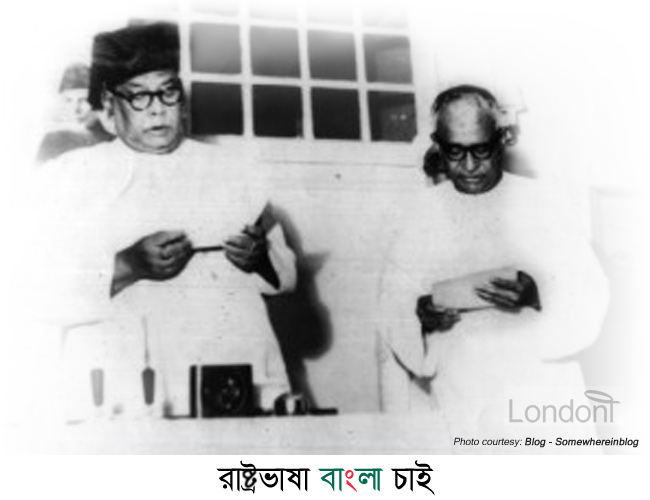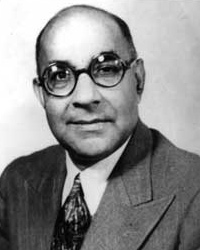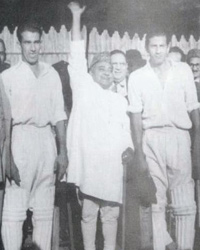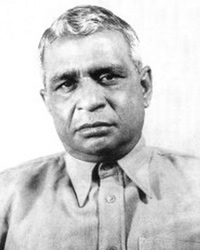
Dhirendranth Datta stands up for Bangla in Constituent Assembly of Pakistan
Last updated: 5 October 2017 From the section 1952 Bhasha Andolon
The second session of the Constituent Assembly of Pakistan (CAP) was held at Karachi on 25 February 1948 and was attended by Liaquat Ali Khan, first Prime Minister of Pakistan, and Khawaja Nazimuddin, Chief Minister of East Bengal. It was proposed that the members would have to speak either in Urdu or English in the Assembly. Dhirendranath Datta, a member from East Pakistan Congress Party in Comilla, tabled an amendment motion to include Bengali as one of the languages of the Constituent Assembly along with Urdu and English.
He rose to address the President of the Constituent Assembly of Pakistan, Muhammad Ali Jinnah, and said in no quivering voice:
Sir, in moving this - the motion that stands in my name - I can assure the House that I do so not in a spirit of narrow Provincialism, but, Sir, in the spirit that this motion receives the fullest consideration at the hands of members. I know, Sir, that Bengali is a provincial language, but, so far our state is concerned, it is the language of the majority of the people of the state...and it stands on a different footing therefore. Out of six crores and ninety lakhs [69 million] of people of people inhabiting this State, 4 crores and 40 lakhs [44 million] of people speak the Bengali language. So, Sir, what should be the State language of the State [of Pakistan]?
The State language of the State should be the language which is used by the majority of the people of the State, and for that, Sir, I consider that Bengali language is a lingua franca of our State. It may be contended with a certain amount of force that even in our sister dominion [India] the provincial language have not got the status of a lingua franca because in her sister dominion of India the proceedings of the Constituent Assembly is conducted in Hindustani, Hindi or Urdu or English. It is not conducted in the Bengali language but so far as the Bengali is concerned out of 30 cores [300 million] of people inhabiting that sister dominion [of India only] two and a half crores [25 million] speak the Bengali language. Hindustani, Hindi or Urdu has been given an honoured place in the sister dominion because the majority of the people of the Indian Dominion speak that language. So we are to consider that in our State it is found that the majority of the people of the State do speak the Bengali language then Bengali should have an honoured place even in the Central Government [of Pakistan].
...The language of the State should be such which can be understood by the common man of the State. The common man of the State numbering 4 crores and 40 lakhs find that the proceedings of the Assembly which is their mother of parliaments is being conducted in a language [Urdu], Sir which is unknown to them. Then, Sir, English has got an honoured place, Sir, in Rule 29. I know, Sir, English has got an honoured placed because of the International Character [of English]. But, Sir, if English can have an honoured place in Rule 29 that the proceedings of the Assembly should be conducted in Urdu or English why [then] Bengali, which spoken by the 4crores [and] 40 lakhs of people should not have an honoured place, Sir, in Rule 29 of the procedure Rules.
So, Sir, I know I am voicing the sentiments of the vast millions of our State and therefore Bengali should not be treated as a Provincial Language. It should be treated as the language of the State. And, therefore, Sir, I suggest that after the word 'English', the word 'Bengali' be inserted in Rule 29. I do not wish to detain the House but I wish that the Members present here should give a consideration to the sentiments of the vast millions of our State, Sir, and should accept the amendment [to Rule 29] that has been moved by me.
Dhirendranath Datta fighting in the House (Assembly) for Bangla to be given state status
 Liaquat Ali Khan ()
Liaquat Ali Khan ()  Khawaja Nazimuddin ()
Khawaja Nazimuddin ()  Dhirendranath Datta ()
Dhirendranath Datta ()
Prime Minister Liaquat Ali Khan against Bangla
In response to such public support for an official role for Bangla, Prime Minister Liaquat Ali Khan, a Mohajir who was elected to CAP by the East Bengal Legislative Assembly, and Khawaja Nazimuddin, a fellow Bengali, scathingly attacked Dhirendranath Datta's amendement on the House floor. The Prime Minister linked Urdu to the central role of religion in the division of India and Pakistan, and therefore to Pakistani nationalism and national identity. As far as Liaquat Ali Khan and the leaders of the Muslim League in the 'centre' Karachi were concerned, Urdu was the language of all the Muslims in India, and it had been for those millions that Pakistan had been created at the cost of years of struggle and suffering. As such, he issued a blunt refusal on the pretext of protecting Pakistan unity.
Mr. President, Sir, I listened to the Speech of the Honourable Mover [Datta] of the amendment with very care and attention. I wish the Honourable member had not moved his amendment and tried to create misunderstanding between the different parts of Pakistan. My Honourable friend has waxed eloquence and stated that Bengali should really be the lingua franca of Pakistna. In other words, he does not want Bengali only to be used as a medium of expression in the House, but he has raised indeed a very important question.
He should realise that Pakistan has been created because of the demand of a 100 million Muslims in this subcontinent and the language of a hundred million Muslims is Urdu and, therefore, it is wrong fo rhim now to try and create the situation that as the majority of the people of Pakistan belongs to one part of Pakistan, therefore, the language which is spoken there should became the State language of Pakistan. Pakistan is a Muslim State and it must have its lingua franca, the language of the Muslim nation [i.e. Urdu].
Liaquat Ali Khan’s stresses one nation, one state and one language policy
The Prime Minister criticised Dhirendranath Datta's amendment claiming them to "create a rift between the people of Pakistan" and "take away" the unifying feature of the one language policy. Dhirendranath Datta vehemently denied this.
Other prominent members who also opposed Dhirendranath's motion were Ghaznafar Ali Khan ( Central Minister for Refugees, Relief and Rehabilitation), Alhaj Mohammed Hashim Gazder (a CAP member from Sind), and Tamizuddin Khan (a distinguished member from East Bengal and the Deputy President of the CAP).
Prime Minister Liaquat Ali Khan's argument was emotional and fallacious in that the hundred million Muslims of the undivided India were never a mono-lingual or Urdu-speaking community. Indian Muslims are historically multilingual and the Bengali-speaking Muslims have always outnumbered the Muslims of other language groups of united India.
Hiranmay Karlekar, Writer
At this time, Bengalis made up 44 million of the total Pakistan population of 69 million. On the basis of numbers alone their language deserved at least equal status with Urdu, mother tongue of no more than 3.5% of the population, according to one 1951 statistic. As for English, its retention as an official language should have been time-limited.
Christoph Jaffrelot, editor of "A History Of Pakistan And Its Origins" (2002)
Hindu Bengalis defend against Khwaja Nazimuddin’s plea for Urdu
After speeches of several members, Khawaja Nazimuddin came on the Constituent Assembly of Pakistan floor and claimed that "most of the inhabitants of East Pakistan" think that Urdu should be adopted as the only state language of Pakistan.
Sir, I feel it my duty to let the House know what the opinion of the overwhelming majority of the people of Eastern Pakistan over this question of Bengali language is. I think, there will be no contradiction, if I say that as far as inter-communication between the provinces and the centre is concerned, they [people of East Bengal] feel that Urdu is the only language that can be adopted [as the State language of Pakistan]. But there is a strong feeling that the medium of instruction should be Bengali in educational institutions and as far as the administration of the province is concerned.
Khawaja Nazimuddin, Chief Minister of East Bengal, claiming Bengalis support Urdu
He also referred Liaquat Ali Khan’s statement that "there is no question of ousting Bengali from the province". It was natural on his part as he belonged to an Urdu-speaking feudal family of the Nawabs of Dhaka and was unlettered in Bengali. Liaquat Ali Khan and other anti-Bengali members were challenged on the CAP floor by Hindu members who fully supported Dhirendranath Datta’s historic amendment and vehemently defended the rightful place of Bengali. These supporters included Prem Hari Barma, Bhupendra Kumar Datta and Sris Chandra Chattopadhyaya. In fact, it was only the Hindu members of the CAP who lent their support to Dhirendranath Datta on that day on 25 February 1948 whilst the Muslim members, including Bengali Muslims, abstained from any support.
It is indeed ironic that the leaders of the most maligned minority community of our nation had to volunteer to speak for defending the mother tongue of the majority population of Pakistan.
Dr. M. Waheeduzzaman Manik, Analyst
